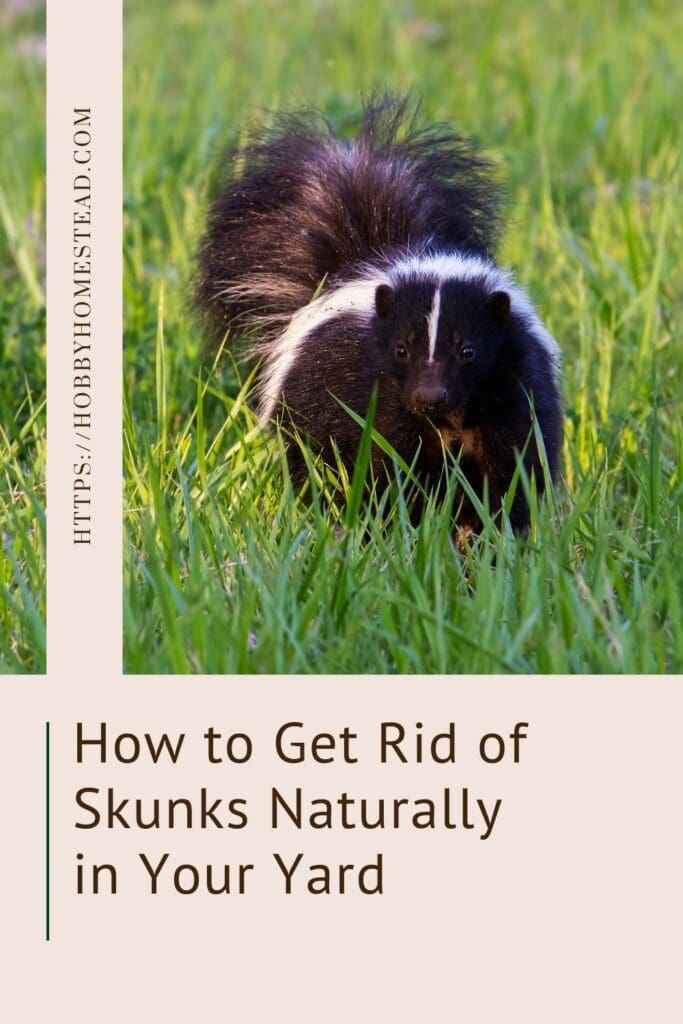On the farm, we’ve had to figure out how to get rid of skunks naturally. If you’ve been dealing with faint musky smells or noticed shallow holes popping up in your yard, you may have a skunk problem.
These nocturnal creatures, often recognized by their white stripes and notorious skunk spray, can become unwelcome visitors.
Spring is an active season
For us, the springtime is the most active time. Warm weather in March and early April is a certain sign that skunks sightings will increase. We also see more dead on the road in greater numbers.
Why? March is breeding season for the striped skunk, whose black-and-white fur and pungent aroma make it unmistakable. The species lives in a variety of habitats, including mixed woods and brush, and it often forages in fields, lawns, and other clearings.
They are omnivores and feed on a wide variety of insects, grubs, berries, and carrion.
The good news? There are plenty of safe and effective ways to deal with these striped skunks and keep your yard skunk-free.

Why Skunks Are in Your Yard in the First Place
Skunks, like most wild animals, are drawn to potential food sources and cozy hiding places. Pet food left outside, overflowing garbage cans, and even fruit trees or vegetable gardens can attract a family of skunks.
They love easy meals, including grubs, bird seed from feeders, and scraps from trash cans. Female skunks often seek out crawl spaces or under sheds as den entrances to raise their young.
How to Know If You Have Skunks
If you’ve noticed some suspicious activity in your yard recently, you might be wondering if skunks are to blame. These nocturnal creatures often leave behind telltale signs of their presence.
Here’s what to look for.
The Smell of a Skunk
One of the first and most obvious indicators is the faint musky smell of a skunk. If a skunk’s spray has been released nearby, it’s unmistakable—foul, pungent, and hard to miss. Even a small dose of this defense mechanism can linger for days.
Small Holes in the Yard
Skunks dig shallow holes in search of grubs and insects, a favorite food source. If your yard is dotted with small cone-shaped holes, especially near vegetable gardens, you might have a skunk problem.
Tracks and Trails
Look for tracks in soft soil or mud. Skunk tracks are unique: they show five toes and claw marks, often resembling little handprints.
Scattered Garbage or Pet Food
If your garbage cans have been tipped over or pet food left outdoors has mysteriously disappeared, a hungry skunk might be the culprit. They’re opportunistic feeders and will raid trash cans or outdoor feeding stations for an easy meal.
Den Entrances or Burrows
Skunks are drawn to cozy hiding places like crawl spaces, under sheds, or near woodpiles. Look for signs of activity around these areas, such as a well-worn path or a den entrance.
Nocturnal Activity
If you’ve spotted a striped skunk wandering through your yard late at night or heard rustling sounds under your deck, it’s a good clue. These nocturnal animals are most active after sunset.
Damage to Lawn or Garden
Skunks might damage your lawn while searching for insects or raid your vegetable garden for easy snacks. They may also go after fallen fruits near fruit trees.
Skunk Tracks Near Water Sources
Skunks often look for water, so areas near a backyard pond, birdbath, or dripping faucet might show signs of skunk activity.
Skunk Sightings
Sometimes, the most obvious clue is spotting a skunk itself—whether it’s a mother skunk with baby skunks in tow or a solo striped skunk searching for food.

The Best Skunk Deterrents and Prevention Tips
If you suspect a skunk is nearby, take steps to confirm its presence and address the issue. The best way to prevent a skunk problem is by eliminating things that attract them in the first place. Garbage cans, pet food, or other hiding places once identified, are the most effective methods to safely deter them from your property.
The first thing to tackle when dealing with skunks is to eliminate what’s attracting them. Here’s how.
Secure Your Garbage Cans and Pet Food
Use sturdy trash cans with tight-fitting lids. Avoid leaving pet’s food, like cat food or dog food, outside overnight, as it’s practically an invitation for nocturnal animals like skunks.
Clean Up the Yard
Skunks are scavengers and will feast on fallen fruits, nuts, and compost scraps. Rake up fruit tree debris and secure vegetable gardens with chicken wire to keep these wild animals at bay.
Bright Lights and Loud Noises
Skunks are nocturnal creatures, so flashing lights or motion sensor lights can be a great solution to scare them off. You can also try using loud noises, such as a radio in strategic locations, to disrupt their nighttime activities.
Natural Skunk Repellents
A mixture of hot peppers, cayenne pepper, and water in a spray bottle works as a natural method to repel skunks. Spray this around potential hiding places, den entrances, or affected areas. Castor oil, and citrus peels are also good options to use as deterrents.
Repellent Granules and Ultrasonic Devices
Commercial products like repellent granules or ultrasonic skunk repellents, available at garden centers or hardware stores, can help keep skunks away. These are especially effective when used near crawl spaces, chicken coops, or other vulnerable spots.
Install Underground Fencing Around Porches, Decks, and Sheds
If you’ve ever discovered a skunk has taken up residence under your porch, deck, or shed, you know how tricky it can be to reclaim that space. Installing underground fencing is one of the most effective ways to prevent skunks and other wild animals from using these areas as cozy hiding spots.
Why Skunks Love These Spaces
Skunks are nocturnal creatures that prefer dark, protected areas to rest during the day or raise a family of skunks. Spaces beneath porches, decks, and sheds are perfect for them because they provide shelter from predators, weather, and human activity.
How Underground Fencing Works
Underground fencing acts as a physical barrier, preventing skunks from burrowing into these areas. Here’s how to set it up:
Choose a Strong Material. Use chicken wire, hardware cloth, or another sturdy mesh material.
Dig a Trench. Dig a trench around the perimeter of the porch, deck, or shed at least 12-18 inches deep. This depth discourages skunks from digging under the barrier.
Bend the Fence. Bend the bottom edge of the wire outward in an “L” shape, extending it about 6 inches horizontally. This prevents skunks from digging underneath.
Secure the Fence. Attach the top of the fencing to the structure to seal off gaps. Make sure it’s snug and secure.
Cover with Soil. Refill the trench with soil and pack it firmly.
Benefits of Underground Fencing
Long-Term Solution. Once installed, underground fencing is a low-maintenance way to keep skunks out for years.
Protects Multiple Areas. It’s a good choice for any structure that might attract a skunk, from crawl spaces to chicken coops.
Safe and Humane. Fencing doesn’t harm the skunks—it simply keeps them from making a home in your yard.
Additional Tips
Before installing fencing, check to ensure no skunks are already living under the structure. Use a one-way door or wait until they’ve left before sealing the area.
Combine fencing with other preventive measures, like motion sensor lights or strong scents such as citrus fruits, to further deter skunks.
The Bottom Line
Installing underground fencing around porches, decks, and sheds is one of the best skunk deterrents you can implement. It keeps these nocturnal animals from turning your structures into their den entrance while giving you peace of mind about your yard.
What to Avoid: Harmful or Ineffective Methods
While it might be tempting, don’t resort to harmful methods like poisoning. These are unsafe and often illegal. Also, the myth about bathing in tomato juice to remove skunk spray? It’s not the most effective method. Instead, mix hydrogen peroxide, baking soda, and dish soap to neutralize the smell of a skunk’s spray.
Preventive Measures to Keep Skunks Away Long-Term
Once the skunk is gone, focus on long-term solutions.
- Fill in small holes or gaps under sheds with concrete slabs or chicken wire.
- Keep bird feeders clean and minimize spillage.
- Use strong scents like citrus fruits or old rags soaked in vinegar to deter them.
When to Call a Pest Control Expert
If a skunk family or baby skunks have taken up residence, or if you’re dealing with multiple species of skunks, calling a pest control expert might be the best choice. They can help safely and humanely relocate the animals.
Dealing with skunks can be a challenge, but with the right preventive measures and natural skunk repellents, you can reclaim your yard from these foul-smelling pests.
Humane Removal: What to Do If a Skunk Has Moved In
If you’ve got a resident skunk, live traps can be a good way to remove it. Use bait like peanut butter or cat food, but check local laws before trapping skunks, as relocation rules vary across the United States.
Are Skunks Good for Gardens?
Believe it or not, skunks can be both helpful and harmful to your garden, depending on the situation. These nocturnal animals play a unique role in the ecosystem and might even bring some benefits to your yard—if you can tolerate their presence. Here’s the full picture:
The Good News: Skunks as Pest Controllers
One of the best reasons to allow skunks near your garden is their natural pest control abilities. Skunks love to eat harmful pests, including:
- Grubs
- Beetles
- Grasshoppers
- Snails and slugs
By feasting on these common garden nuisances, skunks can help protect your plants from insect damage without the need for chemical pesticides.
The Bad News: Skunks Can Cause Damage
Unfortunately, the same behavior that makes skunks great pest hunters can also wreak havoc on your garden:
Digging Holes. Skunks often dig shallow holes in search of grubs, disrupting the soil and damaging root systems.
Raiding Gardens. While insects are their favorite snack, skunks won’t hesitate to nibble on fruits and vegetables, particularly if they’re ripe and easy to reach.
Attracting Other Wildlife. A skunk-friendly garden might inadvertently attract other wild animals looking for food.

Tips for Coexisting with Skunks in Your Garden
If you want to minimize damage while still benefiting from skunks’ pest control, consider these strategies:
Limit Attractants. Keep pet food, garbage cans, and compost bins secure to prevent a family of skunks from settling in.
Use Skunk Deterrents. Natural repellents like citrus peels, cayenne pepper, can keep skunks away from specific areas, like vegetable gardens.
Control Grubs. Reduce skunks’ interest in your yard by applying a grub killer. Fewer grubs mean less reason for skunks to dig around.
Protect Vulnerable Plants. Install chicken wire or raised beds to safeguard your favorite crops.
Skunks can be a mixed bag for gardeners.
While they’re a great solution for controlling pests, they can also cause damage to your plants and soil. By balancing their presence with preventive measures, you can decide whether they’re a good fit for your garden—or if it’s time to gently encourage them to move on.
What You Shouldn’t Do If You Have Skunks
Dealing with skunks requires patience and strategy. While it’s tempting to take immediate action, certain approaches can backfire or even make the problem worse. Here’s what not to do if you have skunks in your yard:
Don’t Panic or Aggressively Chase Them
Skunks are defensive by nature and rely on their infamous spray to protect themselves. If you startle or corner a skunk, you’re likely to end up on the receiving end of their foul-smelling spray. Always remain calm and give them space to move away.
Don’t Block the Den Entrance Too Soon
If you discover a skunk den under a porch or shed, avoid sealing it off immediately. There might be a mother skunk with baby skunks inside. Blocking the entrance can trap the family, leading to unpleasant smells and escalating the problem. Instead, use a one-way exclusion door to allow them to leave but not return.
Avoid Handling Skunks Without Professional Help
Live traps might seem like a good option, but handling a trapped skunk is risky. Not only could you get sprayed, but skunks can also carry diseases like rabies. It’s a good idea to call a pest control expert if trapping is necessary.
Don’t Leave Pet Food or Garbage Accessible
If you continue to leave pet food, open trash cans, or potential food sources outside, skunks will keep coming back. Remove these attractants as a preventive measure.
Don’t Use Harsh Chemicals or Poison
Using poisons or harsh chemicals isn’t just inhumane—it’s illegal in many places and dangerous for pets, children, and local wildlife. Instead, rely on natural skunk repellents like citrus peels, or cayenne pepper.
Don’t Overlook Local Laws
Before taking action, check your local laws about wildlife removal. In some areas, relocating wild animals like skunks is prohibited. Be sure to follow regulations to avoid fines or other legal issues.
Avoid Overwatering Your Lawn
A lawn full of grubs is a buffet for skunks. Overwatering your yard can encourage grub populations, indirectly attracting skunks. Instead, use a grub killer or reduce watering to manage these pests.
Don’t Ignore the Signs
Faint musky smells, shallow holes, or nighttime rustling are signs of a skunk problem. Ignoring these signs can allow the issue to escalate, leading to more significant damage to your yard and garden.
Don’t Assume Skunks Are Gone After One Night
Skunks are nocturnal animals, so their activity might seem sporadic. Even if you don’t see or smell them for a night or two, they could still be nearby. Monitor the area for a couple of weeks to confirm they’ve moved on.
Skip the Predator Urine
Don’t buy skunk deterrents that are based on predator urine. These products are created under inhumane conditions, and are not necessary to repel skunks effectively.
Don’t Forget Preventive Measures
Once you’ve addressed the immediate problem, don’t neglect long-term prevention. Install underground fencing, secure garbage cans, and use motion sensor lights to keep skunks from returning.
When dealing with a skunk problem, avoid rash decisions or harmful methods. Stick to safe, humane, and effective ways to handle these striped visitors, and you’ll have a skunk-free yard in no time.
References
Martha Stewart. How to Keep Skunks Away From Your Yard.
Northern Woodlands. Springtime Skunks: Amorous, Odoriferous and in the Road.
The Humane Society of the United States. What to do about skunks.


